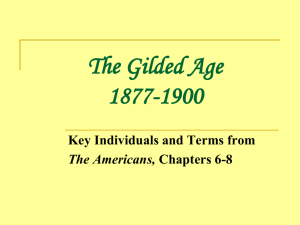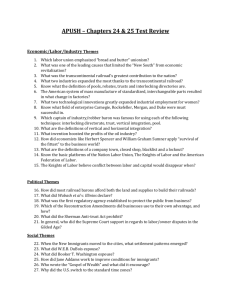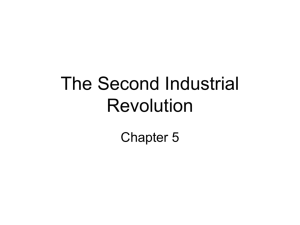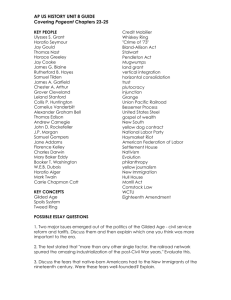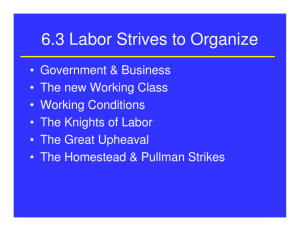THE GILDED AGE TERMS
advertisement
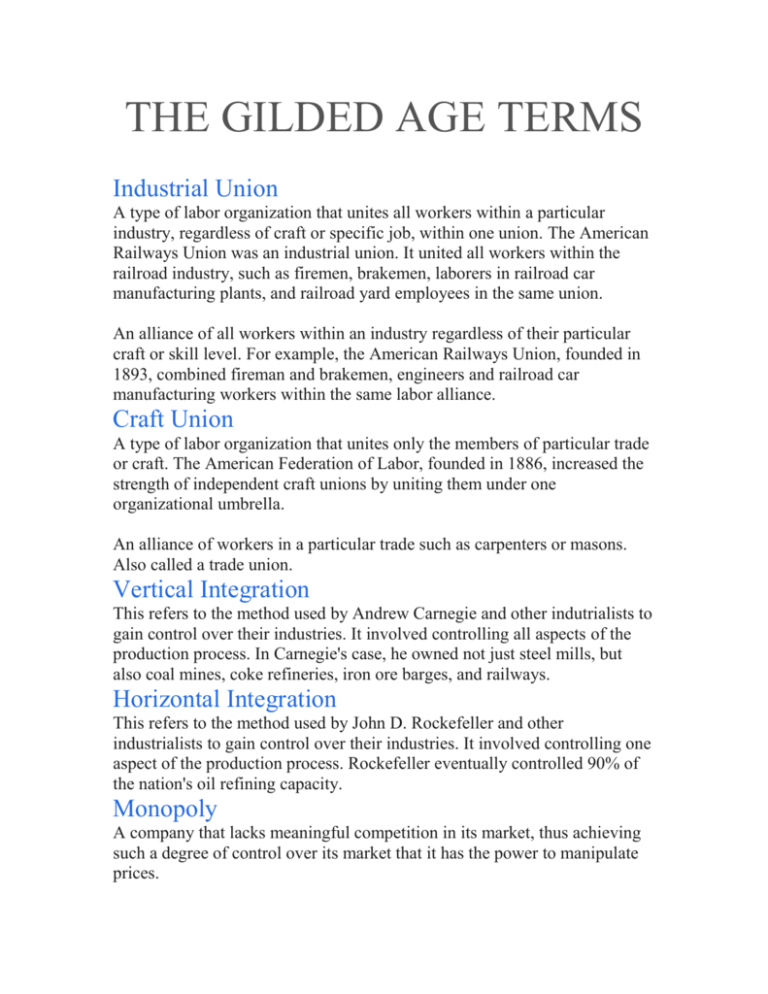
THE GILDED AGE TERMS Industrial Union A type of labor organization that unites all workers within a particular industry, regardless of craft or specific job, within one union. The American Railways Union was an industrial union. It united all workers within the railroad industry, such as firemen, brakemen, laborers in railroad car manufacturing plants, and railroad yard employees in the same union. An alliance of all workers within an industry regardless of their particular craft or skill level. For example, the American Railways Union, founded in 1893, combined fireman and brakemen, engineers and railroad car manufacturing workers within the same labor alliance. Craft Union A type of labor organization that unites only the members of particular trade or craft. The American Federation of Labor, founded in 1886, increased the strength of independent craft unions by uniting them under one organizational umbrella. An alliance of workers in a particular trade such as carpenters or masons. Also called a trade union. Vertical Integration This refers to the method used by Andrew Carnegie and other indutrialists to gain control over their industries. It involved controlling all aspects of the production process. In Carnegie's case, he owned not just steel mills, but also coal mines, coke refineries, iron ore barges, and railways. Horizontal Integration This refers to the method used by John D. Rockefeller and other industrialists to gain control over their industries. It involved controlling one aspect of the production process. Rockefeller eventually controlled 90% of the nation's oil refining capacity. Monopoly A company that lacks meaningful competition in its market, thus achieving such a degree of control over its market that it has the power to manipulate prices. When an individual or single company dominates a particular industry or controls virtually the entire market for a particular good or service, a monopoly exists. Domination over a particular area of business or trade. Pinkertons Founded by Allan Pinkerton in 1850, the Pinkerton Detective Agency functioned initially as an adjunct to local law enforcement officials. During the Civil War, Pinkerton assisted Union espionage efforts in the South. But by the late nineteenth century, Pinkertons, or Pinkerton Guards, were most widely recognized as the private security forces hired by industries to protect their property during strikes. Bessemer Process Developed in England by Henry Bessemer in 1855, the Bessemer process was a way of producing large quantities of steel efficiently and affordably. By pumping air through a furnace or converter filled with molten iron, the impurities within the iron were burned out yielding high grade steel. Andrew Carnegie recognized the value of the new technology, especially for the construction of steel railroad rails, and made the first large-scale use of it in American industry in 1873. Dumbbell Tenement This was a style of tenement housing that became quite widespread in New York City in the late nineteenth and early twentieth century. Dumbbell tenements were named for the shape of their floor plans; the buildings were as wide as their lots at the front and back, but narrower in the middle, leaving lightwells between neighboring tenements to allow a certain amount of fresh air to reach the interior of the structures. While the dumbbell tenements were supposed to be more healthy than their predecessors (which often filled their entire lots, leaving many apartments with no windows to access to light or fresh air), the dumbbell tenements often became badly overcrowded with immigrant tenants crowded into tiny living spaces in unsanitary conditions. Tammany Hall This was the Democratic political organization that dominated New York City politics from the mid-1850s through the 1920s. It drew much of its electoral strength from the city's immigrant population. Political bosses like George Washington Plunkitt cultivated political support by providing jobs and services to working-class immigrant voters. Industrial Paternalism This was the philosophy implemented by George Pullman at his plant near Chicago. Believing that industrialists had an obligation to care for their workers, he surrounded his factory with a company town complete with schools, parks, and churches. But workers complained that rents and utility prices were higher in Pullman than in neighboring towns. Their dissatisfaction with Pullman Town contributed to their decision to strike in 1894. Pullmans Palace Car Company Founded by George Pullman, this company designed and built railroad sleeping cars. Pullman designed his first sleeping car in 1857, but he did not establish Pullmans Palace Car Company until 1867. In that year he also built a factory outside Chicago. Believing that employers had an obligation to care for their workers, Pullman built a town next to his factory, complete with schools, parks, and churches, for his employees in 1880. Pullman Town still stands as a monument to Pullman's labor philosophy labeled industrial paternalism, Socialist Socialists advocate, to varying degrees, government ownership and/or control of major industries. During the Gilded Age, some economic reformers called for socialistic reforms such as the ownership of railroads and public utilities. Gilded Merriam-Webster's defines gilded as "to overlay with or as if with a thin covering of gold."56 Mark Twain suggested that the decade after the Civil War was gilded because a façade of wealth thinly veiled the political and economic corruption plaguing American society. Political Machine The term refers to the political organizations that dominated politics in American cities during the late nineteenth century. Machines, like Tammany Hall, were criticized for cultivating electoral support by distributing government jobs and contracts to voters and donors. Many political machines were also characterized by graft—the use of political power to advance the private interests of machine leaders. Pool In a pool or cartel industrial competitors make informal or "gentlemen's" agreements about production levels and pricing. Critics charged that these violated the competitive principles of the marketplace. Defenders argued that they eliminated the irregularity and wastefulness of unregulated markets. Holding Companies/Trusts While technically different, holding companies and trusts operated in much the same way. They were large partnerships, formed by ostensibly competing companies in order strengthen their control over the market without violating anti-monopoly laws. In these partnerships, the stock certificates from several companies were exchanged for trust certificates, and then a board of trustees exercised governance over all of the theoretically independent companies within the trust or holding company. Laissez Faire This French phrase, meaning literally "let do," or "leave alone," is most commonly used to describe a set of economic theories that supports maximum private freedom and minimal government interference in the economy. During the Gilded Age, laissez faire advocates argued that government involvement hindered economic development and distorted the natural and equitable forces of economic progress. Government intervention was considered tantamount to "class legislation"—an unjust and artificial reallocation of economic resources and power from one group to another. Crédit Mobilier This firm was at the center of the largest and most high-reaching scandal during the presidential administration of Ulysses S. Grant. The Crédit Mobilier was a railroad construction company owned by Union Pacific executives and major stockholders that over-charged the federal government for construction costs. When allegations of fraud were levied against the company, government officials, including President Grant's vice-president, Schuyler Colfax, shielded the company from government investigation in return for company stock. Hamiltonian The term refers to a set of beliefs about government support for national economic development first advanced by Alexander Hamilton, the nation's first Secretary of the Treasury. Hamilton supported the creation of a national bank and protective tariffs. Later "Hamiltonians" supported government funding of internal improvements such as roads, canals, harbors, and railroads. Whigs The Whig Party grew out of the National Republican faction of the Republican Party during the 1830s. Led by John Quincy Adams, Henry Clay, and Daniel Webster, Whigs believed that government power should be used to advance economic, social, and cultural improvements such as roads, canals, harbors, schools, and scientific institutions. Divided over the issue of slavery, and left leaderless by the deaths of Clay and Webster, the party collapsed during the 1850s. But many of its principles, including a belief in the value of federal action in promoting economic development, were retained by the Republican Party of the late nineteenth century. Sabbatarianism This nineteenth-century reform movement sought to impose restrictions on business activities and entertainment on Sundays out of respect for the Christian Sabbath. States' Rights This was a broad collection of beliefs that emphasized the powers reserved to the states under the Constitution. Most states' rights theorists argued that the federal government's powers were expressly defined by the Constitution, and that federal law-makers and officials should confine themselves to a narrow and literal interpretation of federal powers. A broad collection of beliefs that emphasized the powers reserved to the states under the Constitution. Most states' rights theorists argued that the federal government's powers were expressly defined by the Constitution, and that federal law-makers and officials should confine themselves to a narrow and literal interpretation of federal powers. During the nineteenth century, this was a broad collection of beliefs that emphasized the powers reserved to the states under the Constitution. Most states' rights theorists argued that the federal government's powers were expressly defined by the Constitution, and that federal lawmakers and officials should confine themselves to a narrow and literal interpretation of federal powers. Populists The Populists, or People's Party organized during the 1890s to secure political and economic reforms benefitting farmers and, to a lesser extent, industrial workers. The party ran its first presidential candidate in 1892 and adopted a platform calling for increased government regulation of the railroads, the substitution of income taxes for property taxes, the creation of government storage and credit facilities, labeled regional subtreasuries, that would loan farmers money while they waited for crop prices to rise, and the free coinage of silver in order to increase the nation's money supply. The Grange The Grange, or the Order of Patrons of Husbandry, was founded in 1867 to address the problems confronting American farmers during the second half of the nineteenth century. Unable to afford useful but expansive new technologies and faced with high storage and transportation costs, the Grange established machinery and storage cooperatives, and campaigned for increased government regulation of the railroads. The Grange was also a social organization. It organized activities such as dances and quilting bees to combat the loneliness of rural life. Farmer's Alliance Following the example set by the Grange, the Farmers Alliance was founded in Texas in 1876 to address the problems confronting American farmers during the second half of the nineteenth century. The Alliance formed equipment and marketing cooperatives, encouraged federal regulation of the railroads, and developed a plan for government storage and credit facilities, labeled regional subtreasuries, that would loan farmers money while they waited for crop prices to rise. In 1892, Farmers' Alliance leaders joined others farmer advocates in calling for a third party leading to the founding of the Populist or People's Party. Knights Of Labor Founded in 1869, the Knights of Labor sought to build a comprehensive labor organization uniting workers of all races, genders, ethnicities, and occupations. The Knights campaigned for the eight-hour day, child labor restrictions, and the initiative and referendum. More fundamentally, they sought to build more cooperative labor-management relations; they envisioned industries governed by councils of workers and managers within genuinely democratic, and ultimately collectively owned enterprises. During the 1880s, the Knights grew rapidly, especially after successfully coordinating a strike against the Southwest Railroad System. By 1886 it had 750,000 members. But after an eight-hour day rally at Chicago's Haymarket Square turned violent in 1886, the public image of the Knights deteriorated and membership collapsed. Even though an unaffiliated pair of anarchists was convicted for initiating the Haymarket violence, the Knights were found guilty in the public eye by association. Wildcat Strike This refers to a spontaneous labor action, one not called or organized by a union. Free Silver This referred to the proposal advanced by the Populists and other currency reformers interested in expanding the nation's money supply. While fiscal conservatives argued that all currency should be backed by gold, ensuring a limited supply of money with a certain, fixed value, others suggested that the money supply should be expanded through the introduction of "greenbacks" or the unlimited coining of silver. Free silver proponents generally suggested that silver should be valued at a ratio of 16 to 1—sixteen ounces of silver would equal one ounce of gold. Anarchism This refers to a diverse collection of social and political philosophies. The form most common to America at the turn of the century was associated with Emma Goldman. She sought to replace the repressive institutions of capitalism, and the governments that served them, with a society based on the "free grouping of individuals for the purpose of producing real social wealth." Goldman, and other anarchists, tended to view labor associations, rather than private corporations or the government, as the sort of "free grouping" that should govern society and manage the economy.

